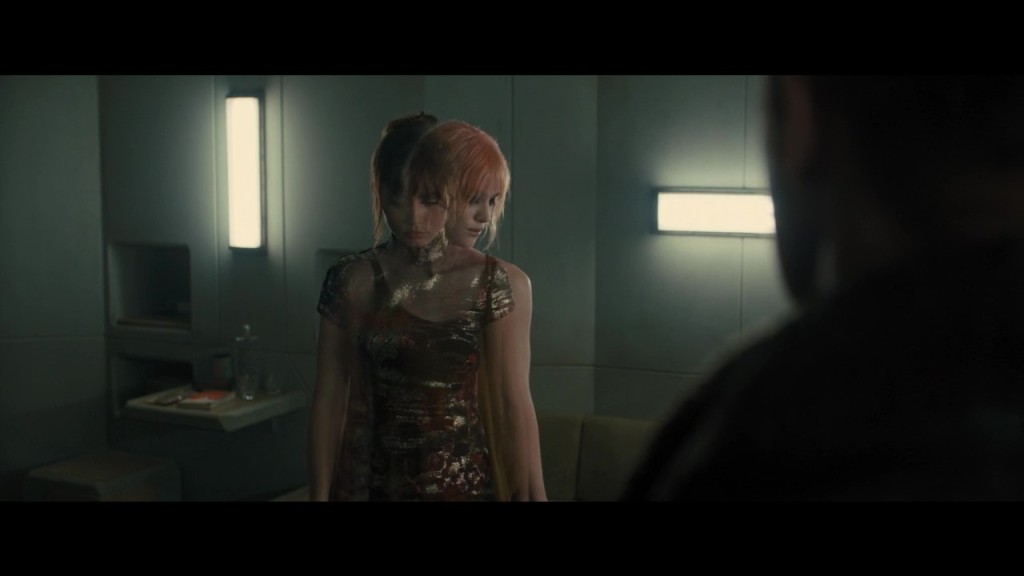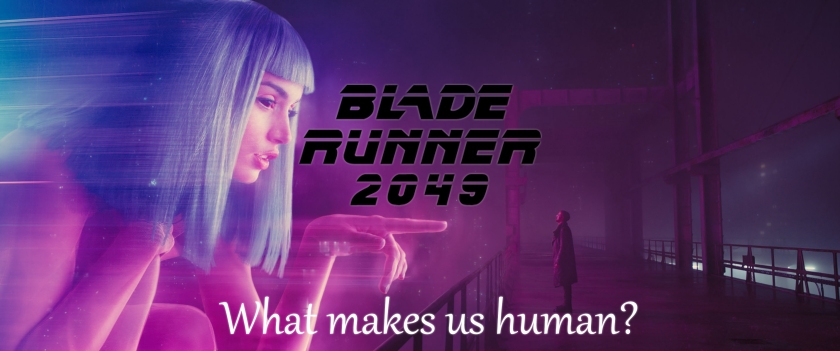Alan Turing once said, “Machines can never think as humans do. but just because something thinks differently, doesn’t mean it’s not thinking at all.”
Well, it’s a really pretty quote, except Alan Turing never said that. This quote is from the 2014 movie, Imitation games starring Benedict Cumberbatch. You’ve probably heard of it, it was in the Oscars and got a lot of recognition. But what about the man the movie is based on? Well, not quite. Much like any other person to ever walk the surface of the earth, Alan Turing, the father of Artificial intelligence himself, has been lost in time… you know, like tears in rain.
But what it is about science fiction is particular that is so keen on exploring the idea of AI, dating back to the original Blade Runner in 1982, that it keeps raising questions like, “Can machines think?” or “Are machines human?”, over and over in the central theme of the story. Maybe, it’s because only by examining the abstract, we can understand the real. We explore the intelligence in machines, to delve deep into the notion of what makes us human.
But to me, the Blade Runner films have never been about whether machines are human, I mean for one, the artificial beings inhabiting the Blade Runner universe are not very machine-like. They always seem to hide a deeper question underneath.
“What does it even Mean to be human?”
The blade runner universe comprises of replicants and humans. The replicants look like humans, talk like humans and probably even feel like humans do, except they are made by humans themselves. So they are denied the right to be considered equal to the humans. Which is evident from how the Blade Runners are hired to “retire” them once they cross their expiration date or are of no use to their creators. The replicants are not killed or murdered, they are retired like an old piece of junk.
Blade Runner 2049 begins with Ryan Gosling’s Detective K, retiring an old replicant. Living in the almost uninhabitable dystopian version of Los Angeles, K is a replicant himself, working for the LAPD as a Blade Runner, following the orders of his human superiors and being mocked and bullied in and out of work. The humans hate him because he’s a replicant and the replicants hate him because he works for the humans, they call him a “skinjob” – probably the the n-word equivalent of blade runner universe, but K seems to have made peace with all the constraints put on him. He’s accepted his position as an inferior being in front of the more superior homo sapiens, and has build his own small world for him, with his partner Joi, a digital AI, yet another type of man-made consciousness. We’ll get to her later.
THOUGHTS AND FEELINGS

Cogito ergo sum.
I think, therefore I am. It is believed only humans are capable of critical thinking, all other animals lack the ability to think rationally. But, the replicants are more than capable of critical thinking. K is shown to be the most intuitive detective in LAPD, and also trusted with the important case of finding out the lost child of Deckard. And K, doesn’t just investigate because he is ordered to, he is intrigued by the the idea of a replicant giving birth. He says…
“It means they have a soul.”
Throughout the movie K is actively searching for the truth, digging deeper to resolve the mystery. He understand the importance of truth, and actively questions his place in this world just like any human being. He believes in the notion of something bigger than himself, he thinks the truth is what will set him free.
Replicants throughout the Blade Runner films are highly sophisticated and empathetic creatures. Take Roy batty for instance, spilling out poetry in the face of death, reconciling with his whole life, going back to his memories. Even K, though played by a very wooden Ryan Gosling, shows a range of emotions. He is in love with his AI assistant, aspires to be something more, feels emotions like sadness, anger and hopelessness, all key to the identity of humans.
One could argue that those emotions aren’t real, they are programmed responses to situations that are installed in the replicant’s software. But how do we know, our emotions aren’t programmed biological responses to the sensory information picked up by our brain. For all we know, love is just a chemical reaction in our brain, how is that different from a computer generated prompt.
MEMORIES

Our memories make us who we are at present. It dictates our beliefs, choices and decisions in life. We grow and build experiences to help us survive in this world, each experience has it’s own importance in our memory, we learn from our mistakes and derive our understandings from our failures. We base our choices on our memories, bright happy memories gives us the pleasure of joy, and we are often reminiscing about them or trying to recreate similar moments in life only to feel again. On the other hand negative experiences, drive us away and fill our heads with dark thoughts, whenever we think of them it pushes us towards depression and anxiety, and we are very unlikely to do things, meet people, or go places, we associate with particularly bad memory.
So an artificial being can be given memories in such a way that dictate their personality, depending on the skills required of them. K’s memory of the wooden horse is a big influence to his rough and tough personality that makes him a detective, fighting to keep what’s his own. Albeit, all these memories are real, they are somebody else’s but to a replicant they are as real as they can get and they don’t even realise they are not real, like K convinces himself that he is the son of Deckard based on his memories. And sometimes they don’t even realise they are replicants, if they aren’t told that there memories aren’t real real, like rachel, or heck, possibly even Deckard. Their memories make them real, even if they aren’t real themselves.
LOVE

Humans by nature are the most capable of love among any other species known in this world. It might be hard to believe that, considering the amount of hate going on around the world right now, but it is true. Human beings nurture and take care of their off-springs like no other, participate in social activities and gatherings, build and break new relationships continuously, and hopelessly fall in love over and over again. Love is the purest of emotions felt by us, and at the end of the day everything a person is fighting for. Can’t the love between two machines be pure? I want to think so. I mean Rachel and Deckard’s love was so pure, it created a miracle – baby given birth by a replicant.
Blade Runner 2049 takes this idea a little further, by adding the character of Joi to the mix. Joi is an artificial being too, but she has no body. She’s like a more advanced, Holographic version Alex or Siri, a digital assistant that can be a little more than assistant. I’ll be honest, Ryan Gosling’s relationship with Joi in the beginning seemed to be like a real red flag for me. And Villeneuve is such a smart filmmaker, that every time K and Joi share a romantic moment, he cuts back to a scene of Joi being advertised as a sex object, and it fills your brain with doubt and questions. But then it develops into one of the sweetest relationships in cinema history, and the fact that they are not humans or one of them doesn’t have a body never crossed my mind.
SEX AND REPRODUCTION

The Replicants more often than not, are portrayed as objects of sexual fantasy in the Blade Runner films, they either shown as prostitutes or sold off as slaves. Joi is practically marketed like a virtual girlfriend that will do anything you want, like a rpg game. But still, K and Joi overcome all the prejudices of thier society.
The scene where Joi invites a hooker, as host so she can get physically intimate with K, is without a doubt one of the best sex scenes ever put on film, a scene that is by the way very reminiscent of a similar scene from the movie Her. The way the three broken individuals come together to complete what each one them lack, is such a beautiful moment to witness. They are truly whole in this moment, maybe not in the way we understand it, but the feeling cannot be denied.
Sex and reproduction are an undeniable part of the human life, or life of any living organism for that matter. Our entire biology is designed a certain way to facilitate reproduction in an attempt to keep our species alive. It is our way of immortality, if you think of it, passing on the knowledge of our ancestors through our DNA to the progeny. And maybe that is life, passing on, from generation to generation. And that’s why the replicants think the biggest way for them to prove their equality to the humans is finding the child of Deckard and Rachel – a child born out of love, a miracle.
PURPOSE

For Aristotle, writing in the 4th century B.C., being human meant having a telos — an appropriate end or goal.
It is startling that such philosophical ideas were discussed centuries ago, I guess it just goes to show that man is a naturally curious creature, always questioning it’s purpose or place in this world. It is interesting how many actual living and breathing creatures roam around us, without ever actually finding their purpose in life, will they be considered human? I wonder.
K doesn’t have any purpose at the beginning of the film, he’s a puppet to the humans. He just quietly does his work and spends his days aimlessly until he finds himself engrossed in the mystery of Deckard’s child. He believes it is him and assumes his purpose in life. That’s why when he learns that he is not Deckard’s son, all his hopes come falling down. He feels lost in the world all of sudden, like he doesn’t know who he really is. He walks around the streets of LA aimlessly again, as be stands face to face with an hologram of Joi. He’s reminded of her death, and all he has lost to get to this postion. He suddenly finds a new purpose in life, purpose that he is aware will mostly likely get him him killed, but he chooses has telos, an appropriate end. K might not be born naturally, he might not be a human, but at the end he evolves into something more.
Blade Runner 2049 is masterpiece of the cyberpunk genre, from Deakins’ gorgeous cinematography, to Vileneuve’s sharp driecting and Hans Zimmer’s moody music, it is sensory and visual overload, that can only be felt to be to be believed. It is a film that is not afraid to to take it’s time and meditate on it’s characters and aesthetics, and in the process exploring big questions about existence and life.
At the end does it even matter if something is human, or what it means to be one, as long as we are alive and living happily? There was a time when women weren’t considered human, who knows maybe one day machines will be more human than us. Soon, all of this will be gone and lost forever, only our memories of all that is happening right now will remain. So, sit back, relax and enjoy it all in bliss, while it lasts.


I love Blade Runner and all things cyberpunk, so I’m glad that you put out this post exploring such an interesting topic. Thanks for sharing!
LikeLiked by 1 person
I’m glad you enjoyed the post.
LikeLike
Blade Runner is the epitome of dystopic sci-fi movies for me. What does it mean to be human? Reminds me of a science fiction novel I enjoyed — The Understudy
LikeLiked by 1 person
I haven’t read The understudy. Should I check it out?
LikeLiked by 1 person
You should! It’s on kindle unlimited. It raises all the right questions about AI’s that so many sci-fi books wrestle with (remember that brilliant short story “Helen O’Loy,” has an apocalyptic plot (if you enjoy those), and thoroughly “human” characters.
LikeLiked by 1 person
Cool! I’m definitely reading it. Thanks for the recommendations.
LikeLiked by 1 person
A very insightful view of, in both me and my partners , one of the great scifi films of recent times. It also shows how the 2 films can mean so differently to each viewer.
LikeLiked by 1 person
Absolutely, both films are very ambiguous and this completely subjective in nature.
LikeLike
nice
LikeLiked by 1 person
Thanks
LikeLike
Excellent SF critique. Humans rationally create ‘replicants’ as an image of themselves -the result is rationally engineered. Human beings cannot be irrationally objective -or to put it another way, the language processor of the inner mind is at variance with the objective rational mind, and such results that can be expressed are one off ‘works of art’. Of course, Aristotle and Plato would have argued about that….
LikeLike
Couldn’t have said it better sir. Thanks for checking out my post!
LikeLike
Fascinating musings, thank you. You did miss one dimension of the issues by lofting humans to be unequivocally mental superiors to all animals. Humans are neither alone in rational thinking nor a cut above in love and nurture. While this does not impair your essay, it is a missed opportunity in demonstrating the universality of its conclusions.
LikeLike
Thanks for the comment. I really missed out on exploring the intelligence in Animals and other species, my mind was only occupied by humans and machines. I will keep my mid open to other verticals from next time. Thanks!
LikeLike
Loved it! Glad u put out this on your post! Keep up with your work!
By the way.. can’t resist from asking,ur name suggests that you r Bengali right? Actually me being a Bengali girl out here couldn’t stop myself from asking 🤭..bangali Tumi?
LikeLike
Thanks for liking my post! And Yes, ami bangali. Nice to meet you. What’s your name?
LikeLiked by 1 person
Ami Ahiri..Ahiri Lodh..
Nice to meet u too! Je bhabei hok j kono jaygay bhirer maajheo bangali khuje paoai jaay! Taar ekta promaan ekhn pelam! Haha!
LikeLiked by 1 person
Haa eta sotti, bangali sob jayga tei ache.
LikeLiked by 1 person